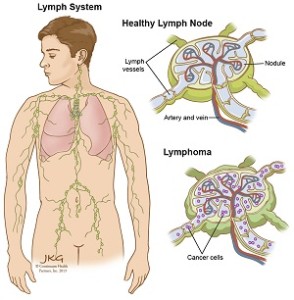In 2002, Ciciline Reid was a 49 year old grandmother who worked seven days a week as a home health aide. On July 28th, she presented to the Montefiore Medical Center emergency room complaining of swelling on the side of her neck and pain on swallowing that was diagnosed as a sore throat and gland infection. She was administered intravenous antibiotics, her condition improved and she was discharged after four days.
Unfortunately, Ms. Reid’s symptoms persisted and after several doctor visits over the next four months, she ended up in the hospital again on December 7, 2002 and was diagnosed with lymphoma (a cancer of the lymphatic system).
For the next two years, Ms. Reid underwent aggressive treatment and despite complete (but only three or four months) remission, the cancer relapsed and she died from the disease on January 11, 2005.
In the ensuing lawsuit, medical malpractice claims were made against the hospital and three physicians for failing to diagnose the lymphoma when Ms. Reid first presented to the hospital in July.
Plaintiff’s expert oncologist testified that a biopsy of an abnormally enlarged lymph node seen on a CAT scan in plaintiff’s neck should have been performed promptly upon plaintiff’s initial treatment at the hospital and that it would have revealed the lymphoma.
The trial in Bronx County concluded on December 6, 2012, after the judge charged the jurors as to the law and then they returned a verdict as to liability specifically finding that:
- plaintiff had lymphoma as of July 28, 2002
- the hospital, through its physicians, was negligent in not diagnosing lymphoma until November 15, 2002, and
- the physician remaining as a defendant (two others had been voluntarily dismissed by the plaintiff before trial) was not negligent
The jury also addressed damages and awarded the sum of $2,400,000 for plaintiff’s pre-death pain and suffering.
Here is the actual verdict sheet completed by the jurors.
The hospital appealed both the liability finding and the damages award. In Reid v. Bharucha (1st Dept. 2015), the malpractice verdict against the hospital was affirmed but the appellate court reduced the pain and suffering award to $2,000,000.
As indicated in the decision, the pain and suffering award was for “one year of additional cancer treatment.” There was evidence that had the lymphoma been diagnosed in July it would then have been Stage I or II with about an 85% prognosis for survival but that because it was not diagnosed until November it was by then Stage IV with the “worst prognosis.”
Ms. Reid underwent an eight cycle chemotherapy regimen with each cycle repeated every three weeks. She would have needed that in either event.
Her cancer remained in remission for almost a year but her expert oncologist testified that had she been diagnosed with lymphoma in July or August, she would have had “an overwhelmingly better response and prolonged remission ….”
Additional treatment following the chemotherapy was needed (which plaintiff’s expert testified could have been avoided had the earlier diagnosis been made) including:
- bone marrow and stem cell transplants
- immunotherpay
- additional sessions of high dose chemotherapy with 10 additional hospital admissions
- splenic infarction (tissue death)
- increased and additional unremitting pain and suffering requiring a morphine pump, Fentanyl patches and other powerful narcotic medicines
The jury also awarded damages for medical expenses, loss of earnings and loss of parental guidance (regarding Ms. Reid’s two adult children). These awards were addressed in a post-trial decision and in the appellate court decision as follows:
- Medical Expenses – $450,000 affirmed
- Loss of Earnings – $60,000 (reduced by the trial judge from $1,200,000)
- Loss of Parental Guidance – $10,000 to each child (reduced from $50,000 each)
Inside Information:
- After the jury began its deliberations, defense counsel offered $750,000 to settle the case. The offer was rejected.
- The medical expenses award was in the amount of the lien asserted for the items paid before Ms. Reid’s death. Defense counsel argued, unsuccessfully, that because the malpractice did not cause the cancer this award should have been reduced to reflect only those items that related to the additional one year of cancer treatment that was necessary due to the delayed diagnosis.

